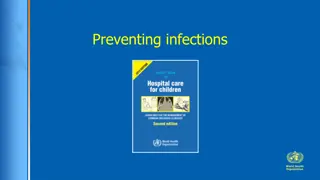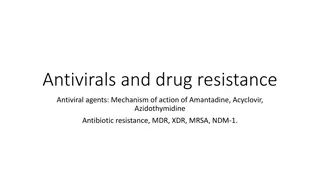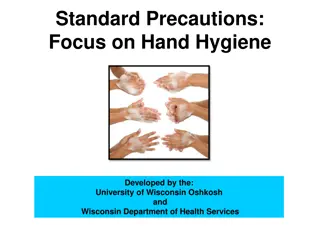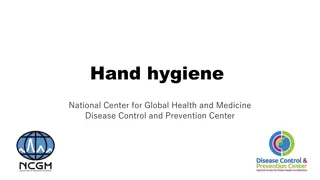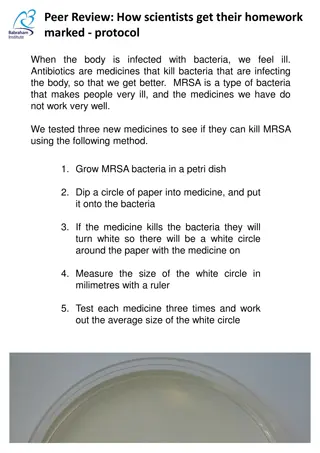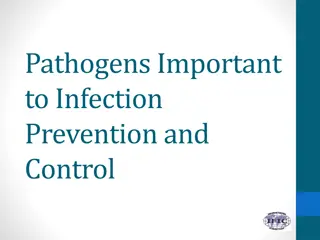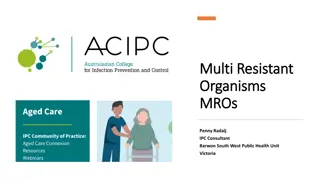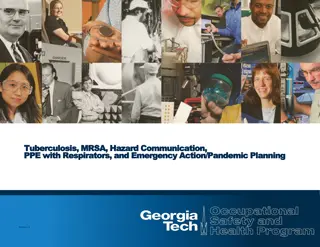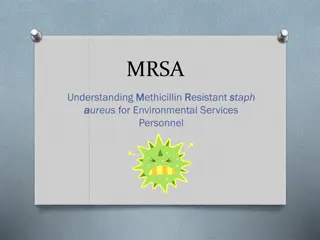Surgical Prophylaxis and Antimicrobial Selection Guidelines in Surgery
Surgical prophylaxis involves administering antibiotics before contamination of previously sterile tissues to prevent infections. Common pathogens in surgical site infections include skin flora like S. aureus. Antimicrobial selection is based on the surgical procedure, likely pathogens, and safety c
5 views • 19 slides
Updated Vancomycin Collaborative Practice Guidelines in 2020
Vancomycin guidelines updated in 2020 include transitioning from trough-based to AUC-based monitoring, emphasizing achieving an AUC/MIC of 400-600 for improved outcomes. Major updates involve loading dose adjustments, targeting AUC/MIC instead of trough levels, and pharmacist-orderable MRSA nasal sw
0 views • 38 slides
Best Practices for Preventing Infections and Antibiotic Stewardship
Preventing infections involves measures such as wearing masks, practicing hand hygiene, cleaning surfaces, and staying home when ill. Multi-resistant organisms (MRO) like MRSA and Klebsiella pose a threat, particularly in healthcare settings. Proper hand hygiene, including using alcohol-based hand s
1 views • 8 slides
Antivirals and Drug Resistance in Microbiology
Antiviral agents like Amantadine, Acyclovir, and Azidothymidine, as well as antibiotics, play a crucial role in combating drug resistance. The emergence of multidrug-resistant pathogens, such as MRSA, NDM-1, and XDR strains, presents challenges in treatment. Various drug categories from first-line t
1 views • 13 slides
Updated Guidelines and Practices for Vancomycin Therapy
The consensus guidelines for vancomycin therapy have been updated in 2020, focusing on switching from trough-based to AUC-based monitoring. Achieving an AUC/MIC of >400 within the first 48 hours is linked to better outcomes in serious MRSA infections. Changes include a new loading dose, therapeutic
0 views • 38 slides
Infection Control and Hand Hygiene Guidelines in Healthcare Settings
Learn about Standard Precautions focusing on hand hygiene to prevent the spread of communicable diseases like Norovirus, MRSA, Influenza, E. coli, and C. difficile. Understand the importance of proper hand hygiene practices in healthcare facilities, such as washing hands with soap and water, using h
0 views • 8 slides
Importance of Hand Hygiene in Healthcare Settings
Hand hygiene plays a crucial role in preventing nosocomial infections, reducing MRSA incidence, and cutting costs in healthcare facilities. Studies have shown a significant decrease in infection prevalence and MRSA cases, as well as substantial cost reductions with proper hand hygiene practices. Mon
0 views • 10 slides
Quality Improvement Project to Decrease MRSA Acquisition in Healthcare Setting
This quality improvement project aims to reduce the acquisition of Methicillin-resistant Staphylococcus aureus (MRSA) in healthcare settings through active screening and targeted interventions. Despite previous efforts, MRSA acquisition rates remained high in specific hospital wards, leading to the
1 views • 28 slides
Peer Review: Testing New Medicines on MRSA Bacteria
Scientists conducted an experiment to test three new medicines on MRSA bacteria to determine their effectiveness. By measuring the size of white circles around paper discs containing the medicines, they were able to compare and analyze the results. The study aims to find potential treatments for MRS
0 views • 7 slides
Special Pathogens for Infection Prevention and Control
Pathogens such as Mycobacterium tuberculosis, Clostridium difficile, and antibiotic-resistant organisms like MRSA and VRE pose significant challenges to infection prevention programs. This content discusses the impact of these pathogens, transmission of tuberculosis, and clinical forms of TB. Antibi
0 views • 51 slides
Multi-Resistant Organisms in Healthcare
Multi-resistant organisms (MROs) pose a significant threat to global health by developing resistance to antimicrobials. MROs like MRSA, VRE, and MRGN challenge standard treatment methods, leading to prolonged infections and increased morbidity. This article explores the increasing problem of antimic
0 views • 21 slides
Tuberculosis, MRSA, Hazard Communication - Workplace Safety Guidelines
Workplace safety guidelines focusing on tuberculosis, MRSA, hazard communication, PPE with respirators, and emergency action/pandemic planning. The content covers inspection procedures for TB cases, respiratory protection enforcement, MRSA and MDRO transmission risks in nursing facilities, and hazar
0 views • 24 slides
MRSA: Methicillin-Resistant Staph Infections
MRSA, or Methicillin-Resistant Staphylococcus Aureus, is a bacteria that causes skin infections and is resistant to common antibiotics. It poses a serious health concern, especially in hospital settings. Carriers may not show symptoms, and the bacteria can survive in various environments for extende
0 views • 20 slides
MRSA Infections: Causes and Impacts
Staphylococcus aureus, commonly known as Staph, can lead to Methicillin-Resistant Staph (MRSA) infections, both in the community and healthcare settings. MRSA outbreaks are often detected in various populations like sports participants, inmates, and military recruits. The types of MRSA infections va
0 views • 16 slides


